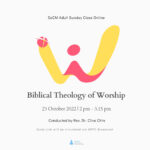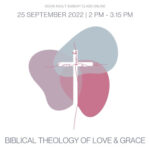Biblical Theology
Is the End Near?
- 24 Nov 2024
- Biblical Theology, Gospel - Doctrine of first importance, and Growing Together in Christ
- Recording
- Presentation
-
In this class, we will focus on the various approaches to interpreting the Book of Revelation, whether the events described are past, future or true of all times. We shall also discuss how Christian interpreters have disagreed on the nature and timing of Christ’s one thousand-year reign on earth relative to His second coming.
The Premillennial, Postmillennial and Amillennial views will be presented and evaluated.
Biblical Theology of Shalom
- 27 Nov 2022
- Biblical Theology and SoCM
- Recording
- Presentation
-
The Hebrew term shalom is full of meaning in the Bible. Generally speaking, it means “peace” and is one of the key themes for salvation in the Bible. In the OT, the Hebrew term refers most commonly to a person being safe, whole, and sound. In the NT, shalom is revealed as the reconciliation of all things to God through the person and work of Jesus Christ.
In this session, we will talk about how Christians can experience shalom with God, shalom with others, shalom with(in) oneself, and Jesus Christ, who is the Prince of shalom or Peace. Finally, we will discuss how the theme of shalom can shape our lives in our present world full of turmoil.
This session was conducted by Rev. Clive Chin
The Biblical Theology of God’s Mission
- 13 Nov 2022
- Biblical Theology
- Recording
- Presentation
-
Given the many challenges – financial, geo-political, and social – that Singapore and the rest of the world are facing today, many people ask where is God and what is he doing about all the problems? How should the church do mission and evangelism?
The entire Bible traces the story from the original creation to the new creation, from humanity’s rebellion against the Creator to God’s provision of redemption in the person and work of Jesus Christ. The main thrust of the Bible is therefore also the story of God’s mission to bring sinful humanity back to himself and to restore it to its original state of living in communion with him.
In our lesson, we will highlight the specific aspects of mission to an unbelieving world and offer practical insights on how to do effective mission and evangelism.
Biblical Theology of Worship
- 23 Oct 2022
- Biblical Theology
- Recording
- Presentation
-
Worship is a dominant theme from Genesis to Revelation, because the God who created all things and redeemed his people in Jesus Christ is worthy to receive all honour, praise, service, and glory. However, since certain expressions of worship are unacceptable to God, it is important for us to know what pleases God and how he wants us to respond to him.
In this lesson, we will discuss what Scripture says about worship and how the biblical theology of worship should control and direct our forms of worship.
The Biblical Theology of the Gospel
- 9 Oct 2022
- Biblical Theology
- Recording
- Presentation
-
The word “gospel” derives from the Anglo-Saxon term “godspell,” meaning “good news.” The Greek word euangelion (gospel) or its verbal cognate euangelizomai (evangelize) together occur more than 130 times in the NT. Whether used in a military, imperial, or religious sense, a gospel was always a message of good news. It is no wonder that the Chinese language describes good news as 福音 (Fúyīn).
The gospel that Jesus proclaimed was no different. It was a well-defined message of good
news. Jesus the Messianic King had come to establish God’s kingdom on earth and forgive
people of sin through his own substitutionary life, death, and resurrection, thereby qualifying them to inherit God’s kingdom if they believe.In this lesson, we will clarify how the content of the gospel was developed through the biblical canon. It will provide an explanation of the gospel in an expansive sense, as well as in a more concise sense. Christians need to understand both in order to live out the life of
discipleship and witness for Jesus.
Biblical Theology of Love and Grace
- 25 Sep 2022
- Biblical Theology
- Recording
- Presentation
-
Of the many biblical themes on God, the standouts must include love and grace. However, the God of the Bible is not an impersonal abstraction. The living God is the God of love and grace. But what do such terms mean? The Bible doesn’t just define these big ideas, but they are embodied in stories as well as in direction affirmations. In particular, it
is Jesus Christ and his story that provide the lens through which to view what the big ideas are about.In this lesson, we will explore how God’s love and grace are demonstrated and portrayed in the Bible. The talk concludes with discussion on their relevance to Christian discipleship and living.
Biblical Theology – People Of God
- 11 Sep 2022
- Biblical Theology
- Recording
- Presentation
-
Why is the People of God one of the most significant and comprehensive biblical teachings in the Bible?
With its roots going back to the creation narrative, this doctrine takes form in the calling of Abraham and becomes the central focus of Old Testament history. That calling of Abraham included the promise of blessing for all nations (Gen 12:3). But the nation of Israel, as God’s
people, suffered judgment. Christ came to fulfil God’s promises to Abraham and thus reconstitute God’s people from all the nations of the earth.In this session, we will consider some of the spiritual benefits and practical implications of being the People of God.
Death and Resurrection
- 28 Aug 2022
- Biblical Theology
- Recording
- Presentation
-
The resurrection of Christ is central to Christian faith (1 Cor 15), and part of the radical newness of the gospel. Paul writes that “our Saviour, Jesus Christ, who has destroyed death and has brought life and immortality to light through the gospel” (2 Tim 1:10).
In other words, the afterlife was an opaque or unknown reality in the OT, only brought to light in the NT through the death and resurrection of Jesus Christ. This is the key to the biblical theology of death and resurrection, affirming both the light shed by the gospel and the relative ignorance of earlier times (cf. Mark 9:10).
Biblical Theology of Priesthood
- 14 Aug 2022
- Biblical Theology
- Recording
- Presentation
-
The Essential concers of a biblical priest involved maintaining holiness and mediating between God and his people. Priests facilitated Israel’s service to and worship of the Lord in the context of its covenantal relationship with God
This lesson aims to accomplish 2 learning outcomes:
- It focus on the function of the Levitical priesthood, Jesus as the ultimate high priest,
- and believers as priests to haighlight their interrelationship in biblical theology.
Finally the Lesson will draw implications for Christian witness and living
The Biblical Theology of Sonship
- 24 Jul 2022
- Biblical Theology
- Recording
- Presentation
-
When the Bible uses the term “son”metaphorically to refer to someone other thana biological son, the range of its usage is ratherlarge. The high point is Jesus the Son of God.Why does the Bible refer to Jesus, for the mostpart, as the Son of God and not God?Christians, too, both men and women, arecalled sons (NIV “children”) of God.
In this lesson, we will explore the range ofmeanings on sonship and its significance inbiblical theology.










